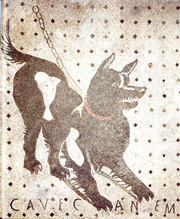
THE MOSAICS IN POMPEII
The oldest type of decorated pavement is the opus signinum, well represented in pre Sullan Pompeii. This type of pavement consists of fragments of bricks and pots set into a layer of lime, in which white tesserae of palombino were sometimes inserted to create a regular dot effect or a carpet of geometric pattern. At the same time the emblemata made their appearance small pictures set at the centre of the pavement and depicting scenes that were inspired by the models of great Greek painting. In Sulla's time the mosaics reflected the taste for the schemes of Style II wall painting, with illusionist perspectives in boxes made of tesserae that became gradually lighter in colour and with patterns of rhombuses with borders of cubes and perspective meanders. Toward the end of the republican period simpler black and white mosaics became popular. They had geometric decorations and figures, surrounded by borders of wave meanders, dentate bands and checker work. Sober geometric mosaics also characterize the period of the early empire; with the Claudio Neronian period there is an increase in traditional I ornamental elements which crowd the composition, while the figured mosaics reflect the luminary’s acquisitions of the light effects that had been experimented in contemporary painting.






